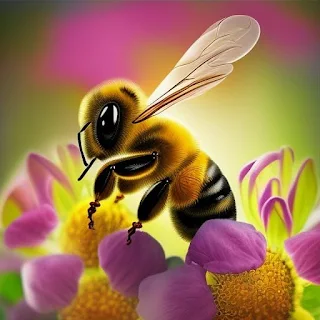The intertwined otherworldly relationship between humans and the world of bees and honey.
Across Africa, beliefs and superstitions intertwine with the natural world, including the enchanting realm of honey, bees, and beehives. These traditions reflect the deep reverence and mystical allure surrounding these buzzing creatures and their golden elixir.
In many African cultures, such as the San tribe in Southern Africa, honey is regarded as a sacred gift bestowed upon humankind, carrying both sweetness and a touch of divine essence. Bees, seen as messengers between the earthly and spiritual realms, are revered for their industrious nature and collective wisdom. Meanwhile, beehives are miniature kingdoms enchanting in their complexity and unity.
One prevalent belief in Cameroon, the Democratic Republic of the Congo, and the Central African Republic is that bees embody ancestral spirits. Their gentle buzzing and delicate dance through the air is seen as messages from departed loved ones, bringing guidance, protection, and blessings to those who encounter them. It is believed that disturbing or harming a beehive can incur the wrath of these ancestral spirits, bringing misfortune and discord upon the offender.
Another superstition in Zimbabwe, Zambia, and Botswana warns against disrespecting or trivializing bees. It is believed that speaking ill of bees, mocking them, or harboring ill intentions towards their hives can provoke their ire. Such actions may result in stinging repercussions, including illness, financial hardship, or other forms of misfortune. As a result, communities foster a sense of respect and caution when encountering bees and their habitats.
According to a unique tradition in Kenya, the owner of a beehive must patiently await a sign before resuming intimate relations with his wife. It is believed that when a swarm of bees takes residence in the hive and begins constructing their home, it is an auspicious indication. Only after two nights have passed, confirming the presence of these industrious insects, can the owner reestablish the bonds of marriage.
If the hive is already occupied during the first inspection visit, a special ritual ensues. The owner prepares a batch of traditional beer brewed with care and reverence. Pouring a portion of this sacred liquid onto the ground is a libation, an offering to the ancestral spirits. This ritual act is performed to honor the presence of these ethereal beings, seeking their blessings and protection for the prosperous coexistence between humans and bees.
In African tribes in Tanzania, Kenya, Uganda, and Ethiopia, beehives are considered sacred dwellings, housing bees and ancestral spirits. Locating a beehive in a particular area is often considered an auspicious sign, indicating the presence of divine blessings and protection. In such instances, communities treat the beehive with reverence, ensuring its preservation and refraining from disturbing the inhabitants within.
Furthermore, honey itself holds a special place in African folklore and medicinal practices in Nigeria, Ghana, Senegal, and Mali. It is often attributed to healing properties and is believed to possess the ability to ward off evil spirits or negative energy. Consuming honey is seen as a source of vitality, longevity, and good fortune. Additionally, honey is frequently used in rituals, ceremonies, and offerings to appease deities, ancestors, and nature spirits.



























